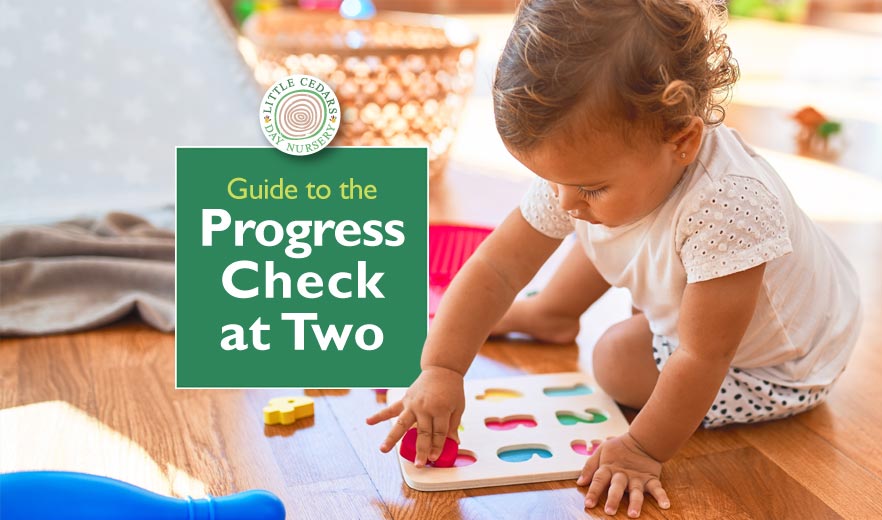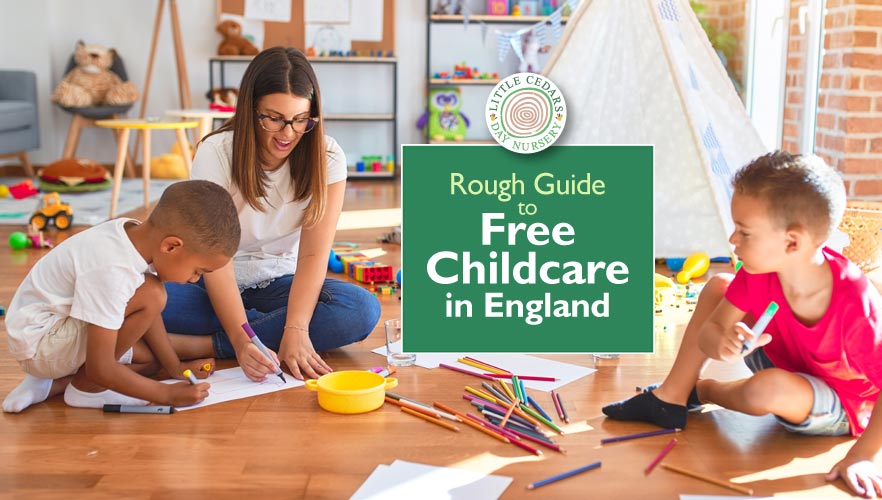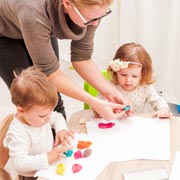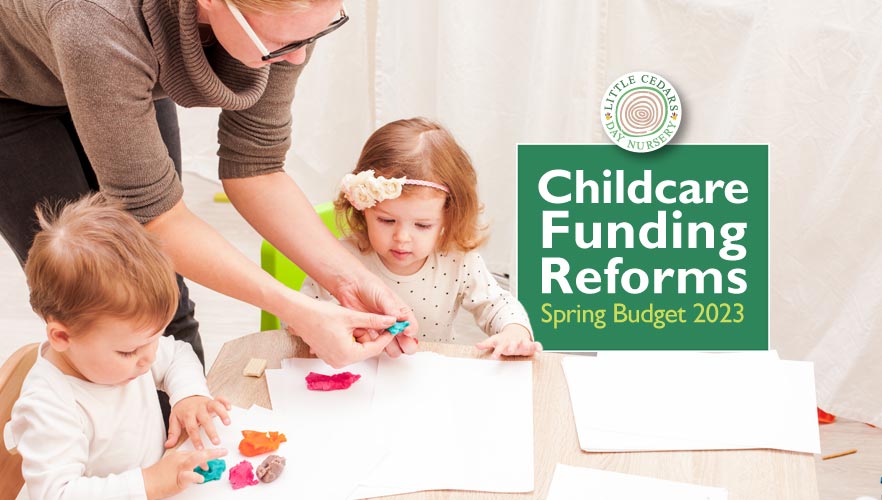
At Little Cedars Nursery, we understand the importance of monitoring growth in children’s learning and development and ensuring they are reaching their full potential. With that in mind, today’s article is a detailed guide to the Progress Check at Two. An essential milestone in children’s early development, the assessment leads to profound benefits for young children. So, today, we will walk you through everything you need to know about the Progress Check at Two, its purpose, what to expect, and how parents* can actively participate.
The Purpose of the Progress Check at 2
The ‘Progress Check at 2’ is a comprehensive evaluation conducted for children who have reached the age of two. This assessment, completed prior to their third birthday, examines their progress across various essential areas of their learning and development journey. Its primary aim is to identify any areas where additional support or intervention1 may be needed. By closely monitoring children’s progress, early years providers can tailor their approach to meet each child’s unique needs and thereby ensure children’s optimum growth and success.
1. In cases where specific educational needs or disabilities are identified, a collaboration between the childcare provider’s Special Educational Needs Coordinator (SENCo) and relevant health professionals or specialists will be built into the support plan that’s tailored to the child’s requirements.
The Significance of the Age of 2
The age of two is a pivotal period in a child’s development. It is during this stage that a child’s progress in learning, speech, language, cognitive abilities, physical growth, and social-emotional development becomes increasingly clear. Ensuring that each area is developing optimally at this early stage will have long-term benefits for the child, so it is important to confirm that everything is on track. A solid foundation for the child’s long-term growth and success can then be built.
Key Areas of Focus
The Progress Check at 2 concentrates on children’s progress primarily in the three ‘prime’ areas of the Early Years Foundation Stage (EYFS) framework. These are:
- Communication and Language,
- Physical Development, and
- Personal, Social and Emotional Development.
However, those involved in conducting the assessment often also evaluate children’s progress in the remaining four ‘specific’ areas of the EYFS curriculum. These are Literacy, Mathematics, Understanding the World, and lastly Expressive Arts and Design.
Preparing Children for School
Initiating the Progress Check at 2 and providing early support increases the likelihood of children overcoming developmental challenges before starting school. This proactive approach prevents setbacks during this crucial period in children’s lives. Without such intervention, children may face difficulties at the beginning of their educational journey, potentially hindering their overall growth and learning long into the future. Without a doubt, the Progress Check at 2 is vital in facilitating a smooth transition into school and fostering children’s long-term success.
Who is Involved?
The Progress Check at 2 is a collaborative effort between a child’s early years childcare provider, their parents and, if applicable, their health visitor and any external professionals that may be involved in the child’s early years learning and development.
The Role of Parents in the Progress Check at 2
The importance of parental involvement during a child’s early years education cannot be overstated. Such involvement is particularly invaluable to early years educators and childcare providers during the progress check. Ultimately, it is also crucially important to the child being assessed. Parents are therefore encouraged to share any observations or concerns that they may have regarding their child’s development. Their insights, combined with those of the child’s childcare/early years provider and those of any external professionals (if applicable), create a holistic picture of a child’s growth and progress. It thereby enables providers like Little Cedars Nursery to organise tailored support to address children’s specific needs most effectively.
The Report
Following the assessment, parents will receive a written summary of the report. This outlines their child’s achievements, strengths, and any areas for further development. The report serves as a valuable tool that allows all involved parties to track a child’s progress over time and to devise a plan of action to support their individual growth trajectory. It also serves as a basis for ongoing communication and collaboration between the childcare/early years provider and the child’s family.
To Sum Up
The Progress Check at 2 is a significant milestone in every child’s early development journey. At Little Cedars Nursery, we are committed to fostering a supportive and engaging environment that nurtures each child’s unique abilities. By actively participating in the progress check process, parents are ensuring that their child receives the necessary support and resources to absolutely flourish. Together, we can help children reach their full potential and prepare them for a successful educational journey ahead.
Little Cedars Nursery, Streatham
Little Cedars Nursery is a ‘Good Provider’ of Childcare & Early Years Education in Streatham


Little Cedars is a good nursery — and that’s official, says Ofsted! Our nursery and preschool are in Streatham, SW16 but are also conveniently close to Streatham Hill, Streatham Common, Streatham Park, Furzedown, Tooting, Balham, Norbury, Colliers Wood, West Norwood, Wandsworth, Clapham and Brixton. We may therefore suit families living or working in those locations.
At Little Cedars Nursery free childcare is available as all Government childcare funding schemes are supported for eligible families (follow the bold links for more information).
Please choose a button below if you’d like to apply for a nursery place for your child, ask a question or arrange a guided tour to see how well your child would fit in. We’ll be delighted to help!
A Clarification:
The ‘Progress Check at 2’ is Different to the ‘2-Year Review’ — but they’re Intertwined
As well as the ‘Progress Check at 2’, there is another, related assessment called the ‘2-Year Review’. Although both occur around the same age, they each serve distinct purposes. In contrast to the Progress Check at 2, the 2-Year Review is more about the child’s health and well-being. It is undertaken by healthcare professionals such as health visitors and assesses overall health. This includes things like immunisation status, physical and mental development, well-being, and parental support. Although separate, the two reviews share overlapping areas and, for that reason, are often conducted simultaneously. The result is thereby a more comprehensive understanding of the child’s development at this key age.
* To avoid repetition in this article and for the sake of brevity, the term ‘parents’ is used as a placeholder for parents, guardians or caregivers.


 With Universal Free Childcare, children aged 3 or 4 can receive up to 570 hours of free childcare over the course of the year.
With Universal Free Childcare, children aged 3 or 4 can receive up to 570 hours of free childcare over the course of the year. With Extended Free Childcare, eligible 3- and 4-year-olds can receive up to 1140 hours of free childcare per year instead of only 570.
With Extended Free Childcare, eligible 3- and 4-year-olds can receive up to 1140 hours of free childcare per year instead of only 570. Some disadvantaged children aged 2 can also receive up to 570 hours of free childcare over the course of the year.
Some disadvantaged children aged 2 can also receive up to 570 hours of free childcare over the course of the year. For those that are eligible, up to £2,000 in free childcare is available each year to children aged 11 or under* through the Tax-Free Childcare scheme.
For those that are eligible, up to £2,000 in free childcare is available each year to children aged 11 or under* through the Tax-Free Childcare scheme. You can sacrifice up to £55 per week of your earnings, which will be free of National Insurance and Income Tax, to fund Childcare Vouchers.
You can sacrifice up to £55 per week of your earnings, which will be free of National Insurance and Income Tax, to fund Childcare Vouchers. Following the Spring Budget 2023, childcare funding through Universal Credit is to be improved with nearly 50% more generous funding becoming available from July 2023.
Following the Spring Budget 2023, childcare funding through Universal Credit is to be improved with nearly 50% more generous funding becoming available from July 2023. Those already claiming for childcare costs via Working Tax Credits may be able to obtain up to £122.50 for one or £210.00 for more than one child each week.
Those already claiming for childcare costs via Working Tax Credits may be able to obtain up to £122.50 for one or £210.00 for more than one child each week. 2-year-olds may be eligible for the ’15 Hours’ scheme from April 2024.
2-year-olds may be eligible for the ’15 Hours’ scheme from April 2024. Up to 85% of childcare costs incurred by students may be claimed, up to a maximum of £188.90 per week for 1 child or £323.85 for 2 or more (correct for academic year 2023-2024).
Up to 85% of childcare costs incurred by students may be claimed, up to a maximum of £188.90 per week for 1 child or £323.85 for 2 or more (correct for academic year 2023-2024). Up to £160 per child is available each week for those living outside London.
Up to £160 per child is available each week for those living outside London. While it’s not designed to fund childcare, it can be used to do so in some circumstances.
While it’s not designed to fund childcare, it can be used to do so in some circumstances.
 March 15th 2023 saw the Chancellor of the Exchequer’s Spring Budget announcement, which included news of extra funding to cover costs for childcare. Crucially, the new funding will support childcare for infants as young as 9 months old for the first time, as well as including other positive changes. Although it’ll be introduced in stages, the free funding should be welcome news for those parents who will be eligible. Let’s take a look today at the proposed childcare changes, including which age groups will benefit, what extra funding is promised to support families and when the new help will become available. First, though, we’ll look at the main aims of the new funding.
March 15th 2023 saw the Chancellor of the Exchequer’s Spring Budget announcement, which included news of extra funding to cover costs for childcare. Crucially, the new funding will support childcare for infants as young as 9 months old for the first time, as well as including other positive changes. Although it’ll be introduced in stages, the free funding should be welcome news for those parents who will be eligible. Let’s take a look today at the proposed childcare changes, including which age groups will benefit, what extra funding is promised to support families and when the new help will become available. First, though, we’ll look at the main aims of the new funding. The ‘main event’ in the Spring Budget from the perspective of childcare provision is the significant expansion of the ‘free hours’ schemes. Previously, only
The ‘main event’ in the Spring Budget from the perspective of childcare provision is the significant expansion of the ‘free hours’ schemes. Previously, only  Some struggling parents in receipt of Universal Credit childcare support, who would like to move into work or increase existing working hours, will have subsidised childcare costs paid in advance under the new proposals. This is in contrast to the existing approach where all parents had to pay for the childcare upfront and then reclaim the costs retrospectively. Funding the childcare costs in advance will make the subsidised childcare costs much easier for the lowest-income families to afford from a practical, cash-flow point of view. It will also hopefully improve the situation whereby, currently, only 13% of eligible low-income families actually claim the childcare element of Universal Credit.
Some struggling parents in receipt of Universal Credit childcare support, who would like to move into work or increase existing working hours, will have subsidised childcare costs paid in advance under the new proposals. This is in contrast to the existing approach where all parents had to pay for the childcare upfront and then reclaim the costs retrospectively. Funding the childcare costs in advance will make the subsidised childcare costs much easier for the lowest-income families to afford from a practical, cash-flow point of view. It will also hopefully improve the situation whereby, currently, only 13% of eligible low-income families actually claim the childcare element of Universal Credit. Although this website and our childcare service are geared to the early years age groups, it would be remiss of us not to include a brief overview of the enhancements that are being introduced for children of school age. These are coming in via proposed changes to what is known as ‘Wraparound Care’ as we’ll explain.
Although this website and our childcare service are geared to the early years age groups, it would be remiss of us not to include a brief overview of the enhancements that are being introduced for children of school age. These are coming in via proposed changes to what is known as ‘Wraparound Care’ as we’ll explain.